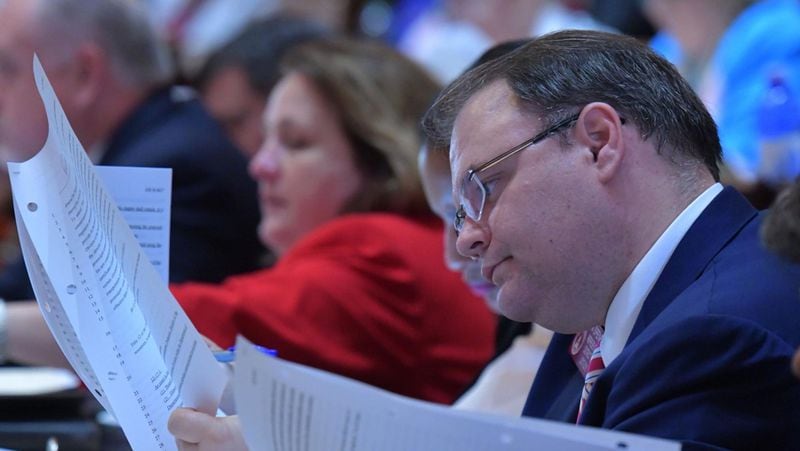The timing couldn’t be more favorable for proponents of a legislative bill that would bolster Georgia’s Hidden Predator Act, widely considered among the nation’s weakest.
Scandals such as the one involving former USA Gymnastics team doctor Larry Nassar, accused of sexually assaulting more than 300 young female athletes, has brought renewed attention to cases of child sexual abuse and attracted widespread support of House Bill 605, says the legislation’s sponsor, Rep. Jason Spencer, R-Woodbine.
RELATED: Lawsuit alleges conspiracy of silence in Boy Scouts sex abuse cases
ALSO: Legislator wants tougher Hidden Predator Act to pursue sex offenders
But the bill, which would close a significant loophole allowing organizations to escape culpability in lawsuits involving perpetrators they’re alleged to have protected, faces opposition from those very organizations — among the most powerful special interests in the state. No entity has worked harder to derail the Hidden Predator Act of 2018 than the Boy Scouts of America, said Spencer.
Lobbyists representing the Georgia Catholic Conference, the insurance industry and the Georgia Chamber of Commerce have also worked behind the scenes against the bill, the legislator added.
In a statement Tuesday, the Boy Scouts said they “strongly support certain parts of HB 605, which would reform the civil statute of limitations for child abuse giving survivors more time to pursue justice. We do not support it in its current form, however, because it does not strengthen efforts that experts agree can help keep children safe and includes provisions that would hinder the ability of youth-serving organizations to protect the children they serve.”
It’s a financially based argument, Spencer said, one commonly used by opponents of the Hidden Predator Act who say it places an undue financial burden on their organizations.
“What they’re saying is ‘If we are sued and we have to pay a financial cost, that’s money that doesn’t go to the programs that are keeping our kids safe,’ ” Spencer said.
It doesn’t take into account the cost paid by victims, many of whom suffer financial liabilities directly related to their struggles in dealing with the abuse, he said.
“At some point we have to hold entities accountable,” Spencer said. “It was their negligent activity that caused this, but they place the burden on the victim.”
The Atlanta Journal-Constitution reached out to lobbyists representing each of the organizations opposed to Spencer’s bill but received no response.
The Georgia chamber previously denied working against the first Hidden Predator Act, passed in 2015, and said in a statement to the AJC last year that “it believes bad actors and those who knowingly participate in abuse should be held responsible. We look forward to working with the legislature to ensure the perpetrators of these heinous acts are prosecuted to the full extent of the law.”
On Wednesday, a judiciary subcommittee, chaired by Rep. Bert Reeves, R-Marietta, is expected to vote on the revamped predator legislation, which would extend the age from 23 to 38 years old for individuals to sue alleged perpetrators and entities like private schools, youth organizations and churches. It would also expand the discovery period from two to eight years and open a one-year window for an individual of any age to sue both alleged perpetrators and organizations accused of shielding them.
That window is the biggest sticking point. It is intended to help victims who have already filed lawsuits — such as the one involving a Gainesville scoutmaster accused of raping a 14-year-old Boy Scout three years after admitting, to the pastor of the church that sponsored his troop, to molesting two boys. In that case, a Cobb County judge threw out negligence claims against the Boy Scouts and Gainesville's First Baptist Church, citing the statute of limitations.
“Just because an agency does good work doesn’t mean they shouldn’t be held accountable for their bad deeds,” said attorney Esther Panitch, who represents Robb Lawson, the plaintiff in the Gainesville Boy Scouts abuse case. “As a defense lawyer I have lots of clients whose good works far exceeded their bad deeds. Does that preclude them from being held accountable?”
In other news:
Those lobbying against the bill have also expressed concerns about the burden of proof required when targeting private organizations. They say such groups should only be held liable in cases only when “actual knowledge” of a cover-up exists, said attorney Darren Penn, who favors a strengthened Hidden Predator Act.
But such direct evidence is rarely available, said Penn, who represents two former Scouts in a sexual abuse suit against Ernest Boland, a longtime Athens Scoutmaster whose predatory behavior was detailed in so-called “perversion files” that the Boy Scouts maintained for decades to identify volunteers accused of child molestation.
“Boland is an exception,” Penn said.
The subcommittee that will decide the bill's future delayed, for a second time, a vote two weeks ago. Committee member Rep. Ed Setzler, R-Acworth raised concerns about due process and what he characterized as "loose" language regarding the liability of entities, mirroring the objections of those lobbying against the bill.
Spencer said he remains optimistic the bill will pass.
“There’s a season for everything and we are in that season,” he said.
About the Author








